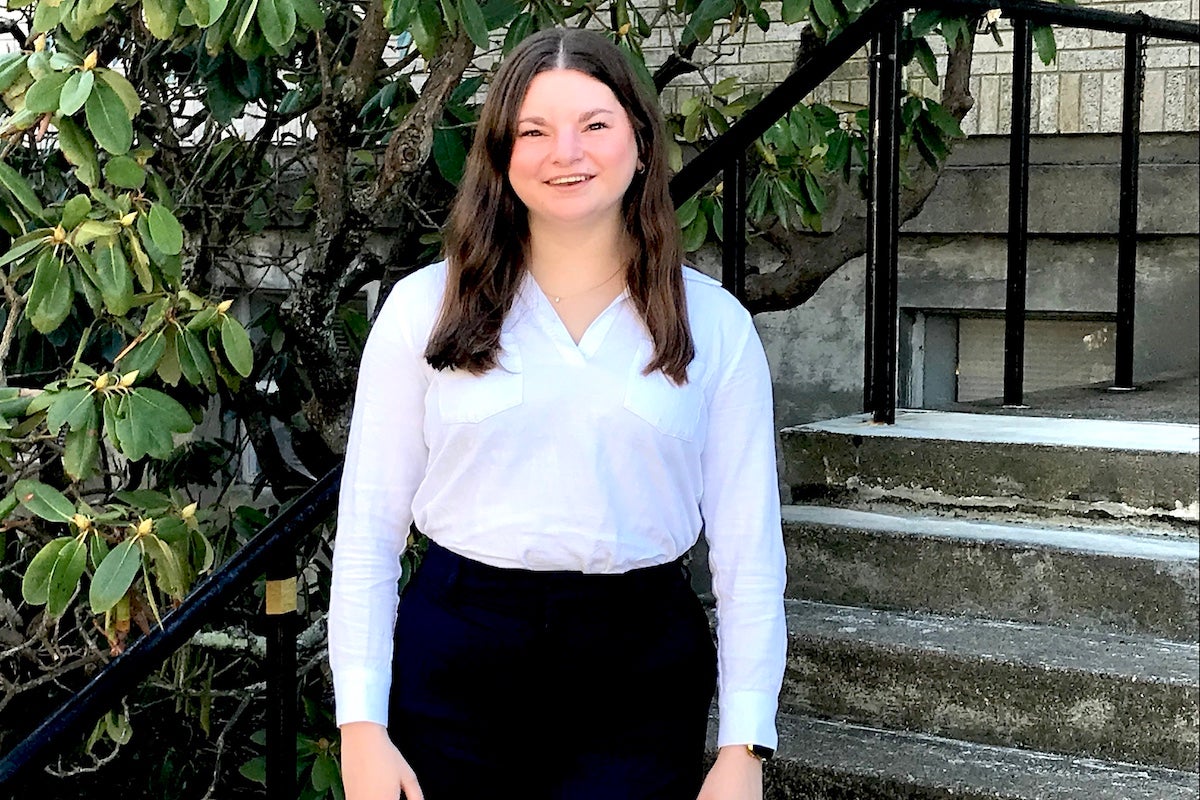Dietetics major Emma Cotter invited to present research at American Society for Nutrition Conference in May
The relationship between social media and nutrition has become increasingly intertwined in recent years, shaping individuals’ dietary behaviors, perceptions and choices in profound ways, especially through dietary trends and fads pushed by “influencers.” University of Rhode Island dietetics student Emma Cotter’s research aims to understand the influence social media has over nutrition and food choices.
Using surveys with URI students aged 18-28, the study aims to explore social media’s impact on dietary choices, focusing on Instagram, Snapchat, Facebook, and YouTube. Cotter examines the frequency and effects of food-related content, analyzing how significantly such online content influences dietary choices among participants. The senior preparing to graduate from the College of Health Sciences this May has been invited to present her ongoing research at the American Society for Nutrition Conference in Orlando on May 31.
“It definitely makes physical and emotional impacts,” Cotter said of social media posts regarding health and nutrition. “People are making changes to their diets without knowing how it affects their bodies, positive or negative, because they’re not asking for a professional opinion on it. At the same time, there’s an emotional part of it because you’re seeing a post that says ‘Don’t have pretzels; have apples instead.’ That may seem positive, but now, every time you have pretzels, you might be feeling guilty about having a few. It’s influencing people’s behaviors and emotional responses and bringing up feeling of guilt.”
Initial results show that social media does indeed hold significant influence over nutrition and dietary choices. Thus far, about half of respondents reported being persuaded by social media advice to add supplements to their diets, including chia seeds, protein powders, probiotics, and magnesium glycinate, which is purported to reduce anxiety and improve sleep. About the same percentage of respondents acknowledge being swayed by influencers to attempt nutrition fads like intermittent fasting and the carnivore diet, which loosely mimics one of the early online fads, the Atkins diet.
“A lot of it is recycled material with just slight tweaks to it. It’s all about the trends,” Cotter said, noting a majority of respondents report feelings of guilt after seeing food-based social media posts. “Atkins was really popular, then it wasn’t, but now it sort of comes back as the carnivore diet. Same with intermittent fasting; it’s coming back with advice to wait a little later to eat breakfast in the morning or to stop eating at this time at night. So they all just come back in different ways. If you don’t have the knowledge of what’s evolved over time with social media, then you are just following trends that are active in the moment.”
That doesn’t necessarily mean all nutrition trends are bad for your health. There is good advice out there, but what is good for one might not be for another. Consumers need to consider the qualifications of the “influencers” giving them advice, Cotter said, and avoid falling victim to the viral nature of social media that tends to lend more credence to some advice simply because it is repeated by multiple people, none of whom may be experts.
“I think they’re trying to influence positive change, but most of the time, it seems people start adopting the trend because they’re just seeing the accumulation of posts saying the same thing,” Cotter said. “It’s a mixed impact overall. I think it’s good that there is content out there making people question the things they’re eating and consuming. But nothing that’s put out on social media is really monitored for its accuracy or whether it reflects research. You never know if an influencer is speaking on behalf of companies that paying them to endorse their products. People don’t always know they’re being paid to give that information.”
While users don’t necessarily need to dismiss social media health trends, Cotter recommends getting the facts from trusted, reliable sources. Look at an influencer’s credentials, and research peer-reviewed articles published in the last 10 years to get up-to-date information, she said. Before making any drastic changes to your diet, consult a doctor, nutritionist, or dietitian.
“Social media significantly influences young adults’ dietary behaviors,” Cotter said. “Platforms like Instagram and TikTok are shaping food choices and users’ emotional responses. Engagement with recipes and healthy eating content often leads to adopting new dietary trends, but the impact varies based on individual perceptions and digital literacy. I think it has some good benefits, but some negative benefits, too, depending on if the user actually knows about nutrition already, or is just trusting everything that’s put out there.”
Cotter, a Cumberland, R.I., native who plans to return to URI to seek her master’s degree as part of the URI-Sodexo MS in Dietetics program, is seeking additional volunteers to better inform her study ahead of her presentation at the end of May. Surveys take 15 to 20 minutes to complete online and ask about social media usage, the proliferation of diet and nutrition posts they see in their news feeds, and whether those posts influence their feelings and actions. Log onto to Cotter’s study website to take part, or email her at emma_cotter2003@uri.edu.

